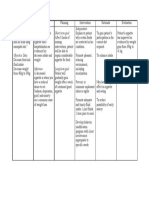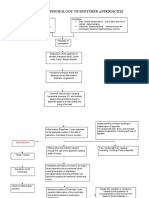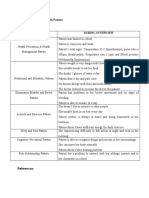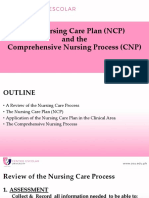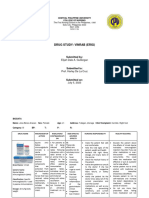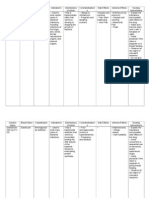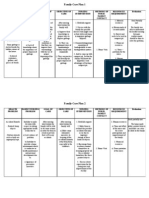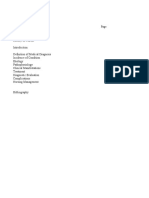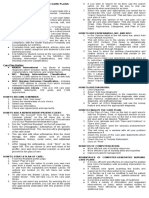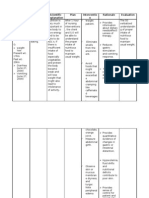0 ratings0% found this document useful (0 votes)
136 viewsPathophysiology of Ugib
Pathophysiology of Ugib
Uploaded by
Chombe JcAge, gender, and race are non-modifiable risk factors for upper gastrointestinal bleeding, while long-term aspirin use and coffee intake are contributing and modifiable risk factors, respectively. These factors can elicit effects on cyclooxygenase, impair mucosal defenses to acid, disrupt the mucous barrier, cause epigastric pain and ulcers that burrow into the gastro-duodenal mucosa, thin arterial walls, and cause weakened walls to rupture, resulting in upper gastrointestinal bleeding that presents as melena, low hemoglobin levels, and symptoms like lightheadedness, weakness, and pale skin and conjunctiva.
Copyright:
© All Rights Reserved
Available Formats
Download as DOC, PDF, TXT or read online from Scribd
Pathophysiology of Ugib
Pathophysiology of Ugib
Uploaded by
Chombe Jc0 ratings0% found this document useful (0 votes)
136 views1 pageAge, gender, and race are non-modifiable risk factors for upper gastrointestinal bleeding, while long-term aspirin use and coffee intake are contributing and modifiable risk factors, respectively. These factors can elicit effects on cyclooxygenase, impair mucosal defenses to acid, disrupt the mucous barrier, cause epigastric pain and ulcers that burrow into the gastro-duodenal mucosa, thin arterial walls, and cause weakened walls to rupture, resulting in upper gastrointestinal bleeding that presents as melena, low hemoglobin levels, and symptoms like lightheadedness, weakness, and pale skin and conjunctiva.
Original Title
184454978-Pathophysiology-of-Ugib.doc
Copyright
© © All Rights Reserved
Available Formats
DOC, PDF, TXT or read online from Scribd
Share this document
Did you find this document useful?
Is this content inappropriate?
Age, gender, and race are non-modifiable risk factors for upper gastrointestinal bleeding, while long-term aspirin use and coffee intake are contributing and modifiable risk factors, respectively. These factors can elicit effects on cyclooxygenase, impair mucosal defenses to acid, disrupt the mucous barrier, cause epigastric pain and ulcers that burrow into the gastro-duodenal mucosa, thin arterial walls, and cause weakened walls to rupture, resulting in upper gastrointestinal bleeding that presents as melena, low hemoglobin levels, and symptoms like lightheadedness, weakness, and pale skin and conjunctiva.
Copyright:
© All Rights Reserved
Available Formats
Download as DOC, PDF, TXT or read online from Scribd
Download as doc, pdf, or txt
0 ratings0% found this document useful (0 votes)
136 views1 pagePathophysiology of Ugib
Pathophysiology of Ugib
Uploaded by
Chombe JcAge, gender, and race are non-modifiable risk factors for upper gastrointestinal bleeding, while long-term aspirin use and coffee intake are contributing and modifiable risk factors, respectively. These factors can elicit effects on cyclooxygenase, impair mucosal defenses to acid, disrupt the mucous barrier, cause epigastric pain and ulcers that burrow into the gastro-duodenal mucosa, thin arterial walls, and cause weakened walls to rupture, resulting in upper gastrointestinal bleeding that presents as melena, low hemoglobin levels, and symptoms like lightheadedness, weakness, and pale skin and conjunctiva.
Copyright:
© All Rights Reserved
Available Formats
Download as DOC, PDF, TXT or read online from Scribd
Download as doc, pdf, or txt
You are on page 1of 1
V.
Pathophysiology
NON MODIFIABLE FACTORS: CONTRIBUTING FACTORS: MODIFIABLE FACTORS:
Age, Gender and Race Aspirin intake for 5 years Coffee intake
Elicit their effects on the Cyclooxygenase
Impaired mucosal defense to acid
Disruption of mucous barrier
Epigastric pain Ulcer burrows deep into the gastro
duodenal mucosa
Thinning of the arterial walls
Weakened walls ruptured
UPPER GASTRO INTESTINAL
BLEEDING
Melena
Low Hemoglobin Level
Light headedness and Pallor, poor skin turgor
weakness and poor capillary refill
Pale Palpebral conjunctiva
You might also like
- Thyroid Cancer Concept MapDocument1 pageThyroid Cancer Concept MapLady Denisse Inolpe MorillaNo ratings yet
- Pcap PathoDocument2 pagesPcap PathoLardel CarayNo ratings yet
- Nursing Diagnosis Care Plan IDADocument1 pageNursing Diagnosis Care Plan IDAAbdallah AlasalNo ratings yet
- Ineffective Health Management Related To Mrs. Gama: Provide The Client Enough Knowledge About The ProblemDocument5 pagesIneffective Health Management Related To Mrs. Gama: Provide The Client Enough Knowledge About The ProblemAndrea Albester GarinoNo ratings yet
- ESRD PathophysiologyDocument2 pagesESRD PathophysiologyMark Ronhel Gallardo PerenalNo ratings yet
- Nursing DiagnosisDocument9 pagesNursing DiagnosisSkyerexNo ratings yet
- PrefixDocument8 pagesPrefixleian28No ratings yet
- Drug Study Form 1 OBDocument1 pageDrug Study Form 1 OBJOSHUA NERZA LACANDOZENo ratings yet
- Subjective Data: Short Term Goal: IndependentDocument1 pageSubjective Data: Short Term Goal: IndependentVanetNo ratings yet
- CELINDocument9 pagesCELINaikoestrellaNo ratings yet
- Novilyn C. Pataray BSN - Ii: Assessment Diagnosi S Pathophysiolog Y Planning Interevention Rationale EvaluationDocument1 pageNovilyn C. Pataray BSN - Ii: Assessment Diagnosi S Pathophysiolog Y Planning Interevention Rationale EvaluationCharina AubreyNo ratings yet
- Module 2 Chapter 02 LabDocument3 pagesModule 2 Chapter 02 LabGlecyl Erika Cinco50% (2)
- FHNCP - PalmaDocument4 pagesFHNCP - Palmachardy101100% (1)
- JRMMC - Patho of Ruptured AppendicitisDocument3 pagesJRMMC - Patho of Ruptured Appendicitis9632141475963No ratings yet
- Drug Study Emergency DrugsDocument6 pagesDrug Study Emergency DrugsJhessa Curie PitaganNo ratings yet
- NCP - Risk For Other-Directed ViolenceDocument2 pagesNCP - Risk For Other-Directed ViolenceKasandra Dawn Moquia BerisoNo ratings yet
- Gordon's Functional Health PatternDocument2 pagesGordon's Functional Health PatternNoriel LacsinaNo ratings yet
- DRUG STUDY LactuloseDocument3 pagesDRUG STUDY LactuloseBRYCE WILLIAM GONo ratings yet
- NCP Knowledge DefDocument1 pageNCP Knowledge DefjorgeacctNo ratings yet
- Discharge Planning DengueDocument2 pagesDischarge Planning DengueChyNo ratings yet
- FNCP @@@@@Document33 pagesFNCP @@@@@Sheryl Ann Barit PedinesNo ratings yet
- NCP and CNPDocument37 pagesNCP and CNPDen TupasNo ratings yet
- Pathophysiology Precipitsting Factors: Predisposing FactorsDocument2 pagesPathophysiology Precipitsting Factors: Predisposing FactorsGeofrey MaglalangNo ratings yet
- ValeraJMP ACT3Document6 pagesValeraJMP ACT3JMICHELLE VALERANo ratings yet
- I. Population: Sex Ratio 96 Males: 100 Females InterpretationDocument25 pagesI. Population: Sex Ratio 96 Males: 100 Females InterpretationanreilegardeNo ratings yet
- Pharmacology m7 Post Task CaparasDocument3 pagesPharmacology m7 Post Task CaparasGretta CaparasNo ratings yet
- "Hindi Ko Kayo Masyadong Marinig Sa Kanang Tenga Ko, Pwede Bang Sa Kaliwang Side Ko Kayo Magsalita?" As Verbalized by The PatientDocument2 pages"Hindi Ko Kayo Masyadong Marinig Sa Kanang Tenga Ko, Pwede Bang Sa Kaliwang Side Ko Kayo Magsalita?" As Verbalized by The PatientMussaib Mushtaq100% (1)
- Urinary Tract Infection Anatomy and PhysiologyDocument12 pagesUrinary Tract Infection Anatomy and PhysiologyPaul Anthony Centeno PimentelNo ratings yet
- Action Plan - Inadequate IncomeDocument2 pagesAction Plan - Inadequate IncomeBenedict James BermasNo ratings yet
- Jacildo LT Module 6 TCNDocument2 pagesJacildo LT Module 6 TCNMeryville JacildoNo ratings yet
- Family Nursing Care PlanDocument2 pagesFamily Nursing Care PlanmartinaNo ratings yet
- Requirement in NCM 312: Submitted By: Jaylee C. Andaya Submitted To: Dr. Ma. Lynne C. ParambitaDocument8 pagesRequirement in NCM 312: Submitted By: Jaylee C. Andaya Submitted To: Dr. Ma. Lynne C. ParambitaChloie Marie RosalejosNo ratings yet
- Achalasia NCPDocument6 pagesAchalasia NCPkarl davidNo ratings yet
- Drug Study CHNDocument3 pagesDrug Study CHNelijahdale.guillergan-05No ratings yet
- Drug Study - OBDocument10 pagesDrug Study - OBArdhel LoslosoNo ratings yet
- Pharmacologi C: For Treatment Of: Maximum Dose: Minimum Dose: Available Forms: BeforeDocument2 pagesPharmacologi C: For Treatment Of: Maximum Dose: Minimum Dose: Available Forms: BeforeAnna LaritaNo ratings yet
- ATORVASTATINDocument1 pageATORVASTATINSHEILA MAE SACLOT100% (1)
- Total Population Number of Households A. Family Members and CharacteristicsDocument20 pagesTotal Population Number of Households A. Family Members and CharacteristicsDenvicNo ratings yet
- Drug Study - GDM - Caltrate PlusDocument2 pagesDrug Study - GDM - Caltrate PlusGAYOL BREEN IRAH A.No ratings yet
- Ineffective Infant Eating Dynamics NCPDocument1 pageIneffective Infant Eating Dynamics NCPandayaannedhesireeNo ratings yet
- Discharge Plan of Abnormal Uterine BleedingDocument4 pagesDischarge Plan of Abnormal Uterine BleedingDenise Louise PoNo ratings yet
- Family Care Plan 1, GladysDocument2 pagesFamily Care Plan 1, Gladysdyosa 4100% (1)
- Health Problem Family Nursing Problem Goal of Care Objectives of Care Nursing Interventions Methods of Nurse-Family Contact Resources Required Human ResourcesDocument1 pageHealth Problem Family Nursing Problem Goal of Care Objectives of Care Nursing Interventions Methods of Nurse-Family Contact Resources Required Human ResourcesCzarina Isabela TuazonNo ratings yet
- Malaria: Pathophysiology, Clinical Manifesta6ons and TreatmentDocument14 pagesMalaria: Pathophysiology, Clinical Manifesta6ons and TreatmentGuilhermeNo ratings yet
- St. Paul University Philippines: School of Nursing and Allied Health Sciences College of NursingDocument5 pagesSt. Paul University Philippines: School of Nursing and Allied Health Sciences College of NursingChristian UmosoNo ratings yet
- Learning Guide: Ngeles Niversity OundationDocument9 pagesLearning Guide: Ngeles Niversity OundationNYCA GRACIA TUAZONNo ratings yet
- Cva Case StudyDocument31 pagesCva Case StudyZoe AnnaNo ratings yet
- Case Study Final PortraitDocument11 pagesCase Study Final PortraitZhy CaluzaNo ratings yet
- Nursing Care Plan About ANEMIA by Payongayong, Chielee Anne A.Document2 pagesNursing Care Plan About ANEMIA by Payongayong, Chielee Anne A.Chielee Anne PayongayongNo ratings yet
- Final RRLDocument4 pagesFinal RRLAnonymous 25dfWwmNo ratings yet
- Pathophysiology of Hypersensitivity Type IIDocument2 pagesPathophysiology of Hypersensitivity Type IItwin_smartyNo ratings yet
- Computer Generated Nursing Care Plans OutlineDocument1 pageComputer Generated Nursing Care Plans OutlineEstelle Rhine100% (1)
- Imbalnce Nutrition Less Than Body RequirementsDocument3 pagesImbalnce Nutrition Less Than Body RequirementselheezaNo ratings yet
- Case Study FetalDocument1 pageCase Study FetalYuki MendezNo ratings yet
- NCPDocument1 pageNCPEve DelosoNo ratings yet
- Hypercalcemia PathophysiologyDocument1 pageHypercalcemia PathophysiologyBeverly PagcaliwaganNo ratings yet
- Drug Study Cap RHPDocument7 pagesDrug Study Cap RHPJan DeeNo ratings yet
- Feeding The AdolescentDocument2 pagesFeeding The AdolescentDenise Marienne MendezNo ratings yet
- Ventricular Septal Defect, A Simple Guide To The Condition, Treatment And Related ConditionsFrom EverandVentricular Septal Defect, A Simple Guide To The Condition, Treatment And Related ConditionsNo ratings yet
- The Ride of Your Life: What I Learned about God, Love, and Adventure by Teaching My Son to Ride a BikeFrom EverandThe Ride of Your Life: What I Learned about God, Love, and Adventure by Teaching My Son to Ride a BikeRating: 4.5 out of 5 stars4.5/5 (2)
- A Qualitative Study of Nursing Student Experiences of Clinical PracticeDocument6 pagesA Qualitative Study of Nursing Student Experiences of Clinical PracticeChombe JcNo ratings yet
- ANXIETYDocument2 pagesANXIETYChombe JcNo ratings yet
- Management of Patients With Neurologic DysfunctionDocument87 pagesManagement of Patients With Neurologic DysfunctionChombe JcNo ratings yet
- Management of Patients With Neurologic DysfunctionDocument87 pagesManagement of Patients With Neurologic DysfunctionChombe JcNo ratings yet
- The Giving Tree PDFDocument2 pagesThe Giving Tree PDFChombe Jc100% (2)
- Assessment of Neurologic FunctionDocument63 pagesAssessment of Neurologic FunctionChombe JcNo ratings yet
- TB-ClinicForm12 Points PtEdDocument29 pagesTB-ClinicForm12 Points PtEdChombe JcNo ratings yet
- Experiences of MAC Student Nurses During Their Clinical DutyDocument4 pagesExperiences of MAC Student Nurses During Their Clinical DutyChombe JcNo ratings yet








